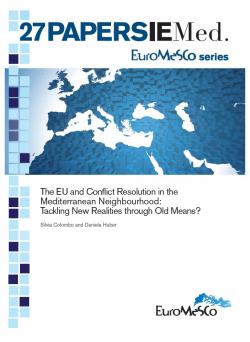The EU and Conflict Resolution in the Mediterranean Neighbourhood: Tackling New Realities through Old Means?
Since the Arab uprisings, conflict realities in MENA have undergone a substantial change that has not been witnessed in the region since the end of colonialism. Not only have ‘old’ inter-state conflicts, such as the Israeli-Palestinian and the Western Sahara ones, not been resolved, but – more pointedly – new, potentially more dangerous intra-state cleavages and (proxy) wars have emerged throughout the region. The cases of Syria and Libya are in point here, as well as the heightened tensions in Egypt between the military-backed regime and Islamist groups. As the EU’s crisis management and conflict prevention policies in the past have been largely perceived as a failure, has the EU reacted in an appropriate way to this change? This paper discusses the extent to which the EU’s conflict-related aims and practices in the Mediterranean region have changed since the Arab uprisings in relation to five conflicts (Israel-Palestine, Western Sahara, Libya, Egypt and Syria).
Result of a research project presented at the EuroMeSCo Annual Conference 2015 “Reviewing the Euro-Mediterranean Relations”, Milan, 8-9 October 2015.
-
Details
Barcelona, European Institute of the Mediterranean, March 2016, 44 p. (IEMed/EuroMeSCo Papers ; 27)
Introduction
1. State of the Art: The EU, Crisis Management and Conflict Prevention
2. New Conflict Realities in the MENA Region
3. The EU and Changing Conflict Dynamics in the MENA Region: Aims and Practices
Israel-Palestine
Western Sahara
Libya
Egypt
Syria
Conclusions
References
Topic
Tag
Related content
-
Ricerca06/01/2014
Euro-Mediterranean Study Commission - EuroMeSCo
leggi tutto



